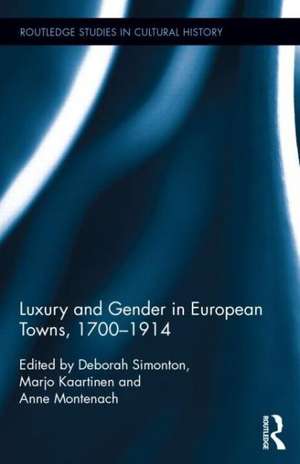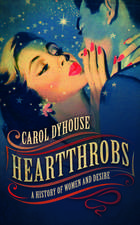Luxury and Gender in European Towns, 1700-1914: Routledge Studies in Cultural History
Editat de Deborah Simonton, Marjo Kaartinen, Anne Montenachen Limba Engleză Hardback – 19 sep 2014
| Toate formatele și edițiile | Preț | Express |
|---|---|---|
| Paperback (1) | 274.33 lei 43-57 zile | |
| Taylor & Francis – 4 iun 2019 | 274.33 lei 43-57 zile | |
| Hardback (1) | 820.73 lei 43-57 zile | |
| Taylor & Francis – 19 sep 2014 | 820.73 lei 43-57 zile |
Din seria Routledge Studies in Cultural History
-
 Preț: 326.01 lei
Preț: 326.01 lei -
 Preț: 311.41 lei
Preț: 311.41 lei -
 Preț: 326.78 lei
Preț: 326.78 lei -
 Preț: 313.60 lei
Preț: 313.60 lei -
 Preț: 311.41 lei
Preț: 311.41 lei -
 Preț: 326.49 lei
Preț: 326.49 lei -
 Preț: 280.29 lei
Preț: 280.29 lei -
 Preț: 665.25 lei
Preț: 665.25 lei -
 Preț: 315.70 lei
Preț: 315.70 lei - 9%
 Preț: 1004.91 lei
Preț: 1004.91 lei -
 Preț: 311.41 lei
Preț: 311.41 lei - 9%
 Preț: 934.80 lei
Preț: 934.80 lei - 9%
 Preț: 276.16 lei
Preț: 276.16 lei -
 Preț: 341.38 lei
Preț: 341.38 lei -
 Preț: 356.83 lei
Preț: 356.83 lei - 30%
 Preț: 848.15 lei
Preț: 848.15 lei - 5%
 Preț: 1290.15 lei
Preț: 1290.15 lei - 30%
 Preț: 849.37 lei
Preț: 849.37 lei - 25%
 Preț: 858.29 lei
Preț: 858.29 lei - 26%
 Preț: 822.34 lei
Preț: 822.34 lei -
 Preț: 438.56 lei
Preț: 438.56 lei - 28%
 Preț: 819.91 lei
Preț: 819.91 lei - 18%
 Preț: 1109.99 lei
Preț: 1109.99 lei - 18%
 Preț: 1055.51 lei
Preț: 1055.51 lei - 18%
 Preț: 1054.71 lei
Preț: 1054.71 lei - 18%
 Preț: 1058.79 lei
Preț: 1058.79 lei - 18%
 Preț: 1068.18 lei
Preț: 1068.18 lei - 18%
 Preț: 1058.65 lei
Preț: 1058.65 lei - 18%
 Preț: 1057.89 lei
Preț: 1057.89 lei - 18%
 Preț: 1110.74 lei
Preț: 1110.74 lei -
 Preț: 487.02 lei
Preț: 487.02 lei -
 Preț: 412.37 lei
Preț: 412.37 lei - 18%
 Preț: 1115.51 lei
Preț: 1115.51 lei -
 Preț: 489.10 lei
Preț: 489.10 lei - 18%
 Preț: 1057.09 lei
Preț: 1057.09 lei -
 Preț: 281.63 lei
Preț: 281.63 lei - 18%
 Preț: 1110.61 lei
Preț: 1110.61 lei -
 Preț: 431.57 lei
Preț: 431.57 lei -
 Preț: 397.32 lei
Preț: 397.32 lei -
 Preț: 440.69 lei
Preț: 440.69 lei - 18%
 Preț: 1060.19 lei
Preț: 1060.19 lei -
 Preț: 442.12 lei
Preț: 442.12 lei - 18%
 Preț: 1052.38 lei
Preț: 1052.38 lei -
 Preț: 432.72 lei
Preț: 432.72 lei
Preț: 820.73 lei
Preț vechi: 1140.93 lei
-28% Nou
Puncte Express: 1231
Preț estimativ în valută:
157.04€ • 164.41$ • 129.95£
157.04€ • 164.41$ • 129.95£
Carte tipărită la comandă
Livrare economică 07-21 aprilie
Preluare comenzi: 021 569.72.76
Specificații
ISBN-13: 9781138803169
ISBN-10: 1138803162
Pagini: 296
Ilustrații: 19 black & white illustrations, 7 black & white tables, 19 black & white halftones
Dimensiuni: 152 x 229 x 20 mm
Greutate: 0.5 kg
Ediția:1
Editura: Taylor & Francis
Colecția Routledge
Seria Routledge Studies in Cultural History
Locul publicării:Oxford, United Kingdom
ISBN-10: 1138803162
Pagini: 296
Ilustrații: 19 black & white illustrations, 7 black & white tables, 19 black & white halftones
Dimensiuni: 152 x 229 x 20 mm
Greutate: 0.5 kg
Ediția:1
Editura: Taylor & Francis
Colecția Routledge
Seria Routledge Studies in Cultural History
Locul publicării:Oxford, United Kingdom
Public țintă
Postgraduate and UndergraduateCuprins
1. Luxury, Gender and the Urban Experience Marjo Kaartinen, Anne Montenach and Deborah Simonton Part I: Markets and Opportunities 2. Milliners and Marchandes de Modes: Gender, Luxury and Skill in the Workplace Deborah Simonton 3. Gender and Luxury in Eighteenth-Century Grenoble: From Legal Exchanges to Shadow Economy Anne Montenach 4. Women in Luxury Trades in Eighteenth-Century Copenhagen Carol Gold 5. Feminisation and the Luxury of Visual Art in London’s West End, 1860-1890 Kemille Moore Part II: Metropole and Province 6. Men, Women and the Supply of Luxury Goods in Eighteenth-Century England: The Purchasing Patterns of Edward and Mary Leigh Jon Stobart and Mark Rothery 7. The Luxury Shopping Experience of the Swedish Aristocracy in Eighteenth-Century Paris Johanna Ilmakunnas 8. Gender, Luxury and Fashion in Eighteenth-Century Barcelona Belen Moreno Claverías 9. Gender, Craftwork and the Exotic in International Exhibitions c. 1880-1910 Stana Nenadic Part III: Class and Status 10. A Feminine Luxury in Paris: Marie-Fortunée d’Este, Princesse de Conti (1731-1803) Aurélie Chatenet-Calyste 11. Favourites of Fortune: The Luxury Consumption of the Hackmans of Vyborg, 1790-1825 Ulla Ijäs 12. The "Díszmagyar" as Representation in the Andrássy Family in Late Nineteenth-Century Budapest Zsuzsa Sidó 13. The Luxury They Could Not Afford?: Households of Workers in the Industrial Town of Drammen, Norway c. 1900 Hanne Marie Johansen Afterword Anne Montenach, Marjo Kaartinen and Deborah Simonton
Recenzii
‘The Danish funding agencies have every reason to be pleased with their decision to invest money in the network Gender in the European Town, and the editors have done a very good job in recruiting scholars from all over Europe. I strongly recommend these volumes to a wide audience.’ - Maria Ågren, Uppsala, L'Homme
Descriere
This volume explores the process of production, distribution, and consumption of luxury goods from a gendered and European perspective, filling a gap in the rich historiography of material culture and luxury consumption, and adding to our knowledge of the role of gender and luxury in shaping the modern town. Focusing on political, social and cultural contexts on the European scale and investigating different local cultures of luxury, it interrogates the concept of luxury itself and its shifting and puzzling meanings.











